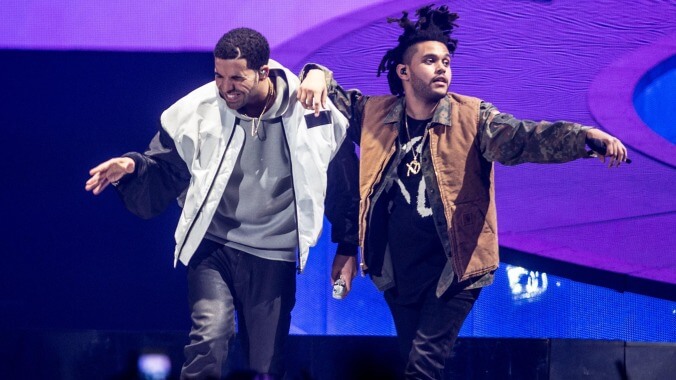The AI-generated Drake-The Weeknd song was submitted to the Grammys for reasons
Ghostwriter's song "Heart On My Sleeve," which uses AI to mimic Drake and The Weeknd, is the first step to a new AI business plot
Aux News Drake
Besides Grimes, there are few big-name artists who have embraced the possibilities of artificial intelligence in popular music. But there is a handful of AI practitioners cropping up who are more or less forcing the issue. One of those is Ghostwriter, who has co-opted the voices of hip-hop stars like Drake, The Weeknd, 21 Savage, and Travis Scott, not just to make music but to carve out a plum new business opportunity. The first step was Internet virality; now Ghostwriter is shooting for legitimization by submitting his AI Drake/The Weeknd collaboration to the Grammys.
The loophole here is that the song, “Heart On My Sleeve,” has been submitted to categories—Best Rap Song and Song Of The Year—that award the writer of a track, not the performer. The AI was only used for the vocals, so “it’s absolutely eligible because it was written by a human,” says producer Harvey Mason Jr., chief executive of the Recording Academy.
It seems unlikely that “Heart On My Sleeve” would actually be nominated for a Grammy, especially since the Recording Academy is a part of the Human Artistry Campaign, which states that “AI can never replace human expression and artistry.” One of the core principles of the campaign is that “performers’ and athletes’ voices and likenesses must only be used with their consent and fair market compensation for specific uses,” and as yet none of the artists Ghostwriter has duped seem to have consented to it. And yet the anonymous Ghostwriter has found an advocate in the Recording Academy’s chief executive, who gushed about Ghostwriter’s work to The New York Times.
“I knew right away as soon as I heard that record that it was going to be something that we had to grapple with from an Academy standpoint, but also from a music community and industry standpoint,” Mason told the outlet. “When you start seeing A.I. involved in something so creative and so cool, relevant and of-the-moment, it immediately starts you thinking, ‘OK, where is this going? How is this going to affect creativity? What’s the business implication for monetization?’”
In fact, “With guidance from Mason, the Recording Academy and its partners in the industry,” the “Ghostwriter team” wants to “work with stakeholders to build a platform that ensures artists who choose to license their voice can control how it is used and make sure they get paid when it is,” per The Times. In other words, Ghostwriter’s whole schtick seems to be a ploy to force artists to buy into a new business model they’re creating from scratch, in which the Ghostwriter team licenses human voices for profit. Feeling the Black Mirror vibes yet?
While the team may be touting the artist’s ability to “control” how their AI-generated voice is used, they are, in a way, holding those artists’ voices hostage to do so. Ghostwriter didn’t give the artists they copied an option to control their voices; the songs were released to the Internet without regard to consent. The 21 Savage/Travis Scott AI collaboration “Whiplash” can almost be viewed as a direct challenge to those artists to buy in or lose the option to control: “If you’re down to put it out, I will clearly label it as A.I., and I’ll direct royalties to you. Respect either way,” Ghostwriter said in a statement about “Whiplash” (via the NYT). Submitting “Heart On My Sleeve” to the Grammys feels like a similar challenge to the industry to engage with Ghostwriter’s vision for the future or miss out on the new wave.
Like many creative industries, it seems the music business is reaching an inflection point when it comes to artificial intelligence. Legally, there are still a lot of gray areas to exploit and few precedents have been set. Unfortunately, it seems like artists will have to act fast to protect themselves before the opportunity is snatched from their hands by opportunists looking to get in on the ground floor of the future of exploitation.
9 Comments
“Besides Including Grimes, there are few no big-name artists who have embraced the possibilities of artificial intelligence in popular music.”There. Fixed for you.
In a sense, shouldn’t these writer-focused categories be judged independent of any given performance? Just require a human performance for any submission. For that matter, have the same people perform all submissions so it’s not being judged on the performer.
What’s the business implication for monetization?Asks the business ghoul who wants to monetize the shit out of this.
The strangest thing happened when I read that quote in the article: I blacked out and woke up several hours later covered in blood.
You too? Can we be blackout buddies?
On a related note, is AV Club still publishing AI-written articles? Haven’t seen one recently.
It’s definitely been a week or two since I saw one. The couple they had were so rudimentary that I think they’ve either scrapped the idea or are just fine-tuning how it works.
How do feel about singers who do a straight imitation of someone else? There’s a bunch of ersatz Michaels Jackson and Freddies Mercury running around out there performing and recording..